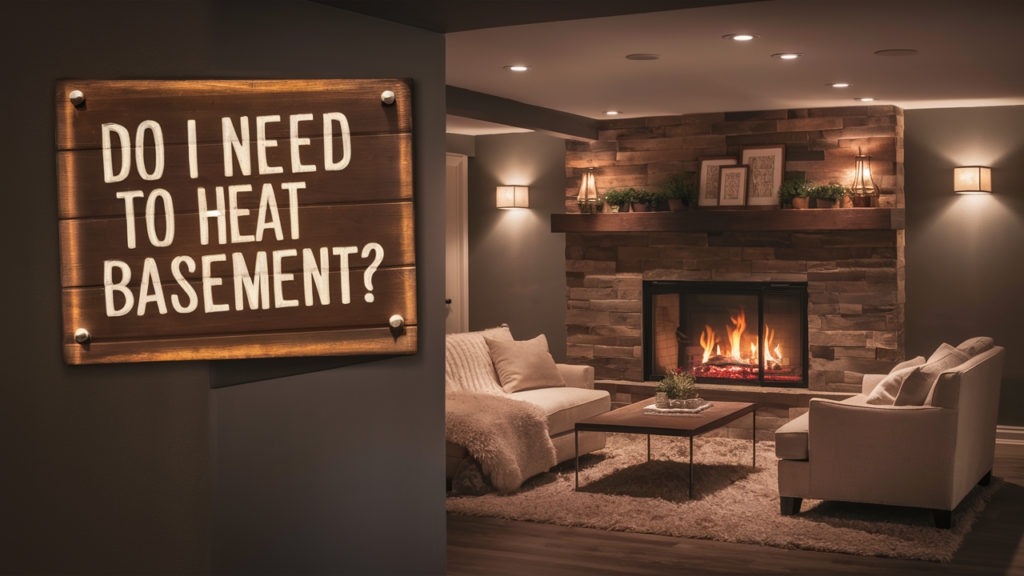Heating your basement depends on its use. If you plan to spend time there, heating is essential for comfort.
Many homeowners overlook their basements, but this space can serve various purposes. Whether it’s a cozy family room, a home gym, or a storage area, maintaining a comfortable temperature is crucial. Basements often have poor insulation and can feel damp or cold, especially in winter.
Heating your basement can enhance its functionality and make it more inviting. It also helps prevent moisture buildup, which can lead to mold and structural issues. Understanding your needs and the basement’s condition will guide your heating decisions. Proper heating can transform your basement into a valuable part of your home.
The Importance Of Basement Heating
Heating your basement is vital for many reasons. A warm basement boosts comfort. It also helps maintain your home’s overall energy efficiency. Let’s explore why heating your basement matters.
Energy Efficiency Concerns
Heating a basement can save energy. Here are key points:
- Cold air from the basement can seep into your home.
- This leads to higher energy bills.
- Proper heating keeps the entire house warm.
Consider these energy-efficient heating options:
| Heating Method | Efficiency Rating |
|---|---|
| Electric Baseboard Heaters | 80-90% |
| Gas Furnaces | 90-98% |
| Heat Pumps | 300-400% |
Comfort And Livability
A heated basement enhances comfort. It creates a usable living space. Benefits include:
- Warm family gatherings
- Comfortable recreational areas
- Improved air quality
Consider these aspects:
- Use the basement for hobbies or entertainment.
- Comfortable temperatures prevent mold growth.
- Warmth helps protect plumbing from freezing.
A well-heated basement invites more family activities. It transforms a cold space into a cozy haven.

Assessing Your Basement’s Heating Needs
Understanding your basement’s heating needs is crucial. Basements can be cold and damp. Proper heating ensures comfort and prevents damage.
Climate Impact On Basement Temperature
Climate plays a big role in basement temperature. Here are some factors to consider:
- Cold Climates: Basements can feel very cold in winter.
- Hot Climates: Humidity can make basements feel sticky.
- Seasonal Changes: Temperature can vary throughout the year.
Check the average temperature for your area. Use the table below to guide your heating decisions:
| Climate Type | Recommended Heating |
|---|---|
| Cold | Insulation and space heaters |
| Temperate | Minimal heating needed |
| Hot/Humid | Dehumidifiers and fans |
Basement Usage And Functional Purpose
The way you use your basement affects its heating needs. Consider these common uses:
- Storage: Minimal heating is usually enough.
- Living Space: Warmth is essential for comfort.
- Home Office: A comfortable temperature is important for productivity.
- Recreation: A cozy environment enhances enjoyment.
Ask yourself these questions:
- How often do I use the basement?
- What activities happen there?
- Is moisture a concern?
These factors help determine the right heating solution for your basement.
Heat Loss And Insulation Fundamentals
Understanding heat loss is vital for basement comfort. A well-insulated basement saves energy and reduces heating costs. This section covers the main sources of heat loss and effective insulation strategies.
Sources Of Heat Loss In Basements
Basements lose heat through several pathways. Identifying these sources helps in planning effective insulation.
- Walls: Uninsulated walls allow cold air in.
- Floors: Cold ground pulls heat from the basement.
- Windows: Single-pane windows lose a lot of heat.
- Doors: Gaps around doors can let in cold air.
- Pipes: Uninsulated pipes can contribute to heat loss.
Insulation Strategies To Retain Warmth
Effective insulation keeps your basement warm. Here are some strategies to consider:
- Insulate Walls: Use rigid foam insulation or spray foam.
- Insulate Floors: Add foam board or carpet over concrete.
- Upgrade Windows: Install double-glazed windows for better insulation.
- Seal Gaps: Use caulk to seal cracks around doors and windows.
- Insulate Pipes: Wrap uninsulated pipes with foam insulation.
Implementing these strategies significantly reduces heat loss. A well-insulated basement enhances comfort and saves money.
| Source of Heat Loss | Insulation Strategy |
|---|---|
| Walls | Rigid foam insulation |
| Floors | Foam board or carpet |
| Windows | Double-glazed windows |
| Doors | Seal cracks with caulk |
| Pipes | Wrap with foam insulation |
Heating System Options For Basements
Choosing the right heating system for your basement is crucial. A well-heated basement improves comfort and increases functionality. Explore traditional and innovative methods to find what suits you best.
Traditional Heating Solutions
Traditional heating systems offer reliable warmth. Here are some popular options:
- Forced Air Systems: Utilizes ducts to distribute warm air.
- Baseboard Heaters: Compact units mounted along walls.
- Radiant Floor Heating: Warmth from below through heated floors.
| Heating System | Pros | Cons |
|---|---|---|
| Forced Air | Quick heating, good air circulation | Dusty, can be noisy |
| Baseboard Heaters | Space-efficient, easy to install | Slower heating, limited coverage |
| Radiant Floor | Even heat, energy-efficient | Higher installation cost |
Innovative And Alternative Heating Methods
Explore new technologies for heating your basement. They offer efficiency and unique benefits:
- Heat Pumps: Moves heat from outside to inside.
- Infrared Heaters: Directly warms objects and people.
- Wood or Pellet Stoves: Eco-friendly and cost-effective.
- Electric Blankets: Simple and portable solution.
Each method has its unique advantages. Choose based on your needs and budget.
Cost-benefit Analysis Of Basement Heating
Heating your basement can seem costly. A thorough cost-benefit analysis helps you decide. This section explores the return on investment and long-term savings.
Calculating The Return On Investment
Understanding the return on investment (ROI) is crucial. Here are some factors to consider:
- Initial Costs: Installation and equipment costs.
- Energy Efficiency: Choose energy-efficient heating systems.
- Home Value: A heated basement may increase property value.
- Usability: More usable space leads to higher satisfaction.
To calculate ROI, use this formula:
ROI = (Net Profit / Cost of Investment) x 100
Net profit includes increased home value and potential rental income.
Long-term Savings Versus Upfront Costs
Consider both long-term savings and upfront costs. Here’s a simple breakdown:
| Cost Type | Upfront Costs | Long-Term Savings |
|---|---|---|
| Installation | High | None |
| Monthly Energy Bills | Moderate | Potentially Low |
| Home Value Increase | None | High |
Weigh upfront costs against potential long-term savings. Consider these points:
- Lower energy bills save money over time.
- Increased home value can yield profits.
- Usable space can lead to rental income.
Heating a basement may seem expensive at first. Yet, the benefits often outweigh the costs.
Installation Considerations For Basement Heating
Heating your basement can improve comfort and energy efficiency. Proper installation is key for effectiveness and safety. Below are crucial factors to consider.
Professional Versus Diy Approaches
Choosing between a professional installation or DIY depends on your skills and budget.
- Professional Installation:
- Expertise in complex systems.
- Ensures safety and compliance with codes.
- Warranties often included.
- DIY Installation:
- Cost-effective solution.
- Requires basic knowledge of heating systems.
- Time-consuming but rewarding.
Essential Steps For Safe Installation
Follow these steps for a safe and efficient installation:
- Assess Your Needs: Determine how much heat your basement requires.
- Choose Heating Type: Options include radiant, baseboard, or forced air.
- Check Local Codes: Ensure compliance with local building codes.
- Gather Tools: Essential tools include drills, wrenches, and levels.
- Prepare the Area: Clear space for installation and ensure ventilation.
- Install the System: Follow manufacturer instructions carefully.
- Test the System: Ensure everything functions correctly before use.
Proper installation of basement heating enhances comfort. Follow these guidelines for a successful project.
Maintaining Your Basement Heating System
Keeping your basement heating system in good shape is important. A well-maintained system works better and lasts longer. Regular care prevents costly repairs and energy waste. Here are some essential tips for maintaining your basement heating system.
Routine Checks And Servicing
Regular checks ensure your heating system runs efficiently. Follow these steps for routine maintenance:
- Inspect Filters: Change or clean filters every 1-3 months.
- Check Vents: Ensure air vents are open and clear.
- Examine Ducts: Look for leaks or blockages in ducts.
- Test Thermostat: Make sure the thermostat functions correctly.
Schedule professional servicing at least once a year. A technician can spot issues early. This keeps your system in top shape.
Troubleshooting Common Issues
Sometimes, your heating system may have problems. Here are common issues and how to fix them:
| Issue | Possible Cause | Solution |
|---|---|---|
| No Heat | Thermostat setting | Check and adjust thermostat settings. |
| Uneven Heating | Blocked vents | Clear any obstructions from vents. |
| Strange Noises | Loose parts | Tighten or replace loose components. |
| High Energy Bills | Inefficient system | Consider upgrading to a more efficient model. |
Following these tips helps maintain your basement heating system. Regular checks and quick fixes keep your space warm and cozy.
Regulatory Compliance And Safety Standards
Understanding regulatory compliance and safety standards is essential. Heating a basement involves following local codes. These codes ensure your home is safe and energy-efficient.
Building Codes And Regulations
Building codes vary by region. They set specific requirements for basement heating systems.
- Energy efficiency: Systems must minimize energy consumption.
- Ventilation: Proper airflow is crucial to prevent mold.
- Insulation: Adequate insulation helps maintain temperature.
Check your local building department for relevant codes. Compliance may include:
- Permits for installation.
- Inspections during and after the installation.
- Adherence to manufacturer guidelines.
Ensuring Safe Operation
Safety is a top priority when heating your basement. Follow these guidelines:
- Regular maintenance: Schedule yearly inspections for heating systems.
- Carbon monoxide detectors: Install detectors to ensure air quality.
- Proper installation: Hire a licensed professional for installation.
Understanding your heating system’s safety features is vital. Familiarize yourself with:
| Feature | Description |
|---|---|
| Safety shut-off | Automatically turns off the system if it overheats. |
| Pressure relief valve | Prevents excessive pressure build-up. |
Following these safety measures ensures a warm and secure basement.
Frequently Asked Questions
Do I Need To Heat My Basement In Winter?
Yes, heating your basement in winter is often essential. Cold temperatures can lead to moisture issues and mold growth. Maintaining a consistent temperature helps protect your home’s structure and prevents damage. Consider heating options that are energy-efficient for cost savings.
What Are The Benefits Of Heating A Basement?
Heating a basement provides comfort, usability, and protection. It allows you to use the space year-round for activities or storage. A heated basement also prevents mold growth and protects plumbing from freezing. Overall, it enhances your home’s value and livability.
How Can I Efficiently Heat My Basement?
To efficiently heat your basement, consider insulation, space heaters, or radiant floor heating. Insulation helps retain warmth, while space heaters can provide targeted heat. Radiant floor heating is an energy-efficient option that evenly distributes warmth. Regular maintenance of heating systems also ensures optimal performance.
Is It Safe To Heat A Basement?
Yes, heating a basement is generally safe when done correctly. Ensure proper ventilation to prevent carbon monoxide buildup from gas heaters. Use electric heaters with safety features to avoid fire hazards. Regular inspections of heating systems help maintain safety and efficiency.
Conclusion
Heating your basement can improve comfort and energy efficiency. It helps prevent mold growth and protects your belongings. Consider your climate, usage, and insulation before deciding. A warm basement enhances your home’s value and livability. Weigh the pros and cons to make an informed choice that suits your needs.








